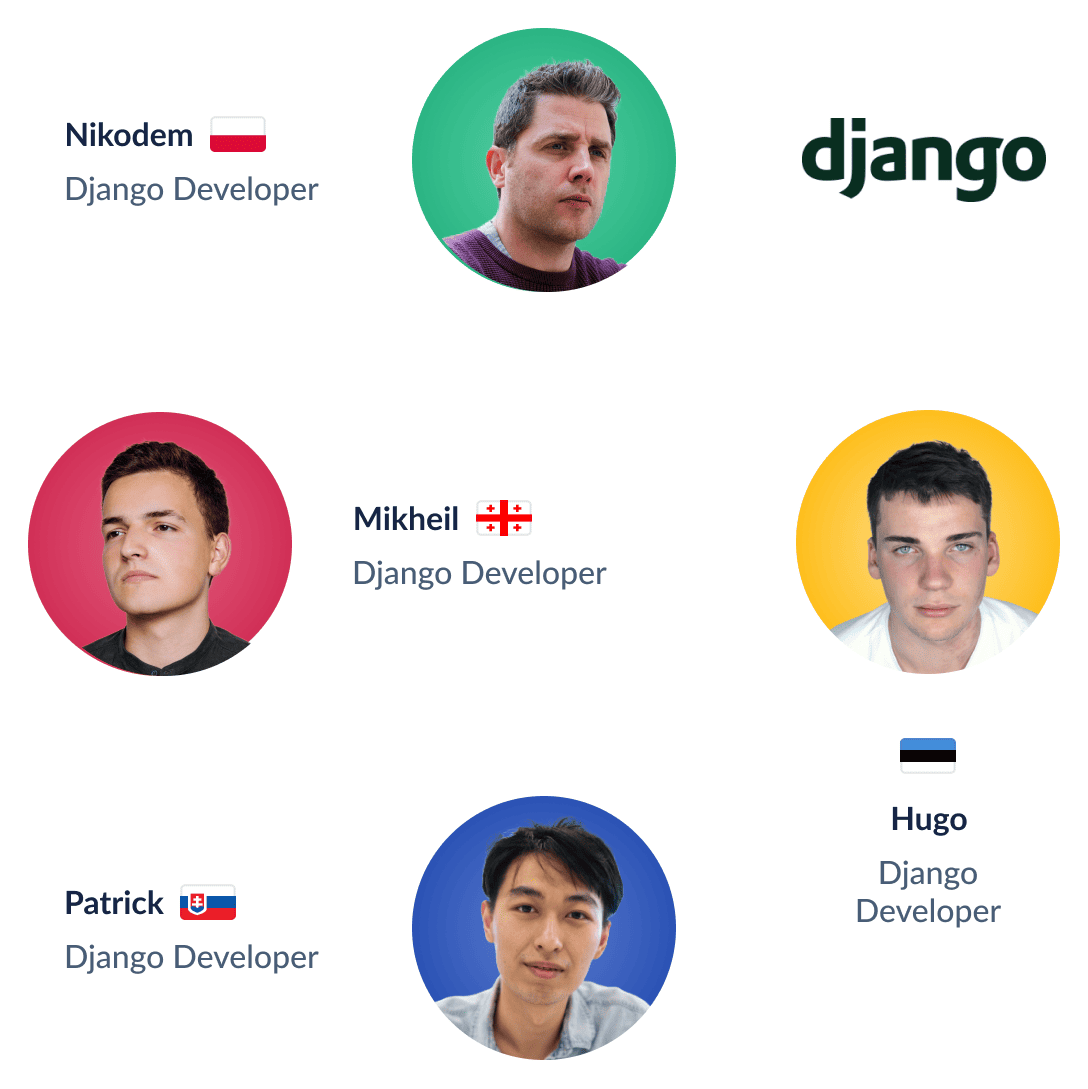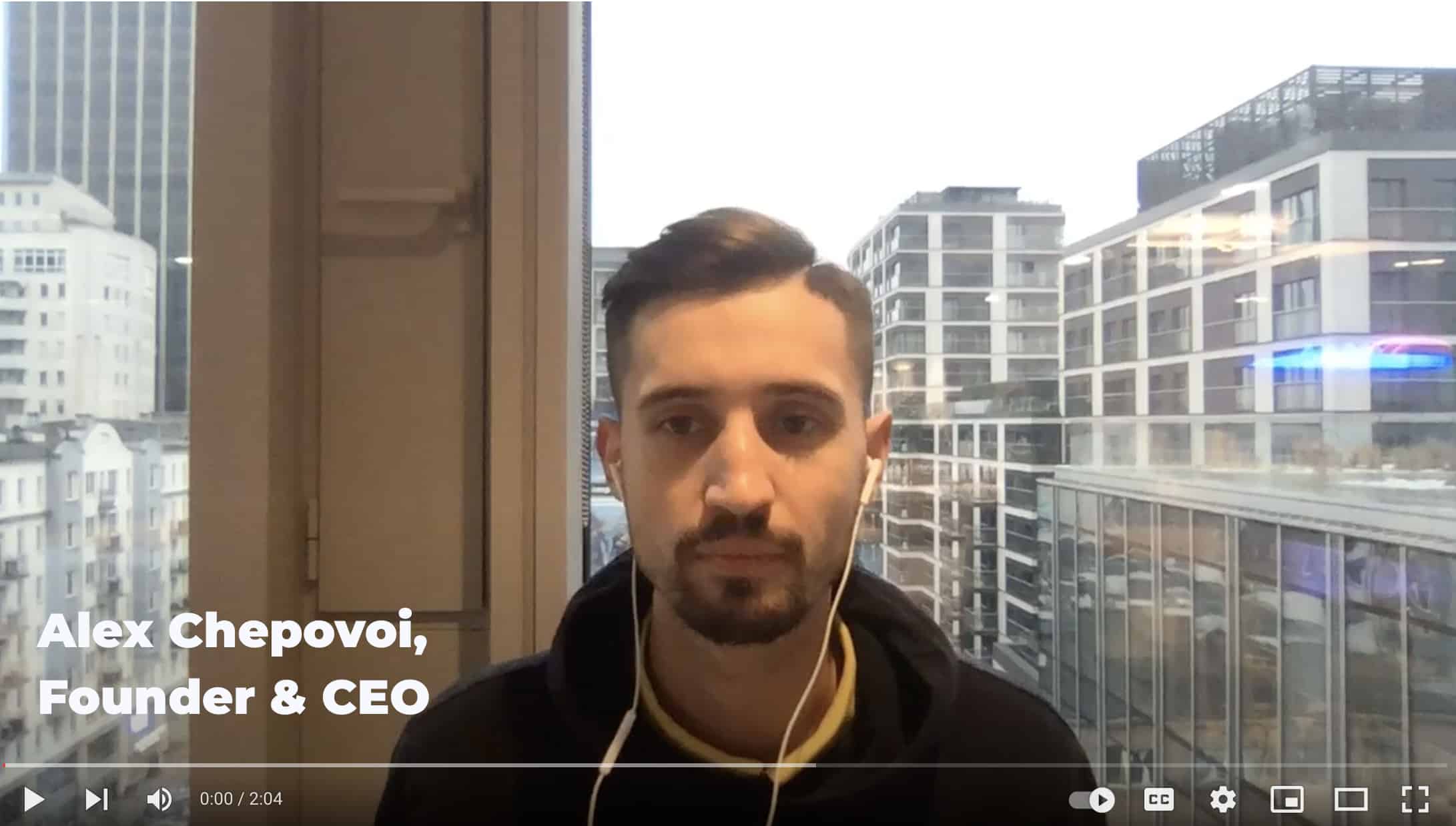Hire Django developers remotely within 3-5 days
You can hire Django developers remotely with Expert Remote. Sign up to access our talent pool. Search available developers, add them to vacancies and schedule interviews.


Hire Top 1% of Django Developers Today
7 years experience
Freelance Django Developer
7 years experience
I love to write code. Not only because I love technology, but also because I like to solve problems, helping people, teams, and society become better. After all, programming is a method of solving problems. My career began with the study of HTML / CSS, and now I can not stay. I’m constantly learning something new, constantly delving into the basic technologies of the Web. Once my friend at work said that programming is how we communicate with people. From this moment, soft skills for me are the most important indicator of my professional activity. I like to work in a team, helping and supporting each other
Show More Show LessDon’t have the time to search developers yourself?
How we do it
Thousands of developers across the world sign up to our platform each month
They go through our rigorous screening process and only 1% make the cut
We add the best candidates to our talent pool where they wait for projects
You can hire from this pool of world’s best developers on a contract basis, within days
Customer reviews
Frequently Asked Questions
Are you an Agency?
Nope.
Well, some clients call us a virtual agency or an agency 2.0 🙂
1. Typical agencies take 50-70% from a developer salary. We take only 15-30%.
2. Agencies have 10-20 developers on their bench (available). We’ve got 500+ devs.
3. Agencies don’t allow developer buy-out. You can hire our developer in-house after 1 year for “2-month salary” fee.
Will I have a contract with a developer or with Expert Remote?
With Expert Remote.
It’s risky to have 5 contracts with 5 remote developers from 5 different countries.
You’ll have a single B2B contract with our company. So, if smth goes wrong with IP or anything, you can always sue us :)
P.S. Our company is registered in the USA and Poland.
How does the pricing work?
Each developer has their own hourly rate with our commission already included.
We take between 15% and 30% from what you pay, which is 2-3x lower than typical agency fees.
No setup fees. You only pay after you hire a developer.
2-week paid trial. If you don’t like our developer after 2 weeks, we’ll apply a 25% discount on the hours worked.
1-week notice. You can ask for a replacement or cancel the contract within a week.
Which countries are your developers located in?
We source developers across 30+ countries.
Most popular countries: Armenia, Georgia, Poland, Serbia, Albania, Azerbaijan, Turkey, North Macedonia, Romania.
We also got developers in the USA, Canada, UK, Germany, France, Spain, Estonia, Bulgaria, Netherlands, Pakistan, India, Kenya, Nigeria, etc.
What are your average rates?
Rates start from $20/h. The median average is $35-40/h.
There’s always top 10% percentile candidates who are overpriced, and bottom 10% percentile underpriced ;) But most fall into the market rate category.
The beauty of global sourcing is tapping into unknown regions. Have you heard of North Macedonia? You can find senior developers for $25/h (our fee included)!
How do you ensure developer quality?
We source developers with marketing, which is 20-30x more effective than Linkedin. This creates us a huge flood of candidates.
Then we take this top of the funnel and feed it into our proprietary vetting process. Only top 1% of candidates make it through.
Part of the process is automated, which allows us to do it at scale. For instance, our recruiters have their calendars fully booked and able to conduct 200-250 soft-skill interviews a month.
What tech stacks do you have?
We have developers across all major stacks.
Back-end: Node.js, PHP, Python, JAVA, .NET, Ruby, GoLang etc.
Front-end: React, Angular, Vue.js, etc.
Mobile: Swift, Kotlin, React native, Flutter, etc.
AI/ML/Data Science is a big stream for us: machine learning, deep learning, NLP, computer vision, etc. Technologies: TensorFlow, PyTorch, Terraform, Pandas, AzureML, OpenCV, etc.
Can I hire the whole team?
Yes!
Apart from developers we’ve got UI/UX designers, QAs, Product Managers, etc.
Based on your requirements we can assemble the whole engineering team.

14 min read
Hire Dedicated Django Developers
Django is a well-known web framework built on Python, a backend programming language. It’s a high-performance technology that has gained significant popularity over the years. With 14.65% of developers using Django worldwide, this framework has proven to be a solid option for many types of web programming. So, companies often strive to hire Django developers for their dev projects.
This text will help you find out what technical and business benefits Django programmers may bring to software development teams: within them, Django developers often either construct backend of the project or, if they are well-versed in front-end programming, they act as a full-stack programmer. We will also provide examples of questions to ask junior, middle, and senior specialists to pick top Django developers.
What Django Back-End Developers Do
Django is a feature-loaded, simple, and time-effective framework. Companies like Facebook and Instagram choose Django as their back-end technology. Python Django developers use it to create server-side functionalities for different projects — so, let’s discuss the details of what they do.
Work with Databases & Under-the-Hood Logic
From the perspective of backend and database management, Django comes with an object-relationship mapping (ORM) feature that helps developers work with non-relational databases and transfer data from them to an app’s objects. ORM helps a Django programmer cut development time, make a product’s logic more portable, and ensure databases like MySQL, SQLite, and others are flexible and easy to change.
Python Django developers use template language, and its construction follows Python’s simplicity principles. Being a Model-Template-View framework, Django’s templates tell the app how data should be presented. Templating language makes it simple to build web pages quickly for even a less experienced python developer. It also simplifies separating the UI part of the website from the backend logic, so Django developers can focus on their code while front-end specialists can modify templates without disrupting the work on the logic. That, too, streamlines the app development process.
Work with Django REST framework
Django REST Framework serves as a toolkit that’s built on top of Django and, at the same time, as a library for building Web APIs of various types. It simplifies the Create, Read, Update, and Delete (CRUD) operations performed by APIs, too.
In-house and freelance Django developers particularly like the Django REST framework because it allows them to turn Django web apps into internal APIs that are then consumed (or, connected) to the JavaScript front-end framework of choice.
DRF provides a Django developer with the opportunity to write the backend for scalability and cross-platform deployment. APIs that are built with it help establish centralization and interconnectivity. If you plan, for instance, to create an Android app right after the website, it’ll be remarkably easy to connect Java/Kotlin structure to Django-based business logic via DRF.
What Django Full-Stack Developers Do
As we’ve mentioned, django freelance and in-house developers can bring more to the project’s development if they’re good at the front-end tech stack. A remote Django developer often gets involved with full-stack development: especially if they’re hired in startups that need to save costs at early stages.
With Django’s powerful API capabilities and template language, it is, as we’ve discussed, easy to maintain several separate front-ends connected to a Django-based backend. Companies often look for Django developers for hire who are also well-versed in CSS, HTML, and JavaScript and familiar with one or several cross-platform frameworks or libraries for web development. As these companies grow, they start to hire separate front-end specialists that do complex and specific UI work based on the legwork that’s already been done.
Why Hire Django Programmers for Your Startup?
Let’s check on some reasons to opt for Django freelancers or in-house developers for your startup:
Django framework’s tech stack is batteries-included
Django framework comes with probably every feature that a company needs to build a fully-fledged backend for a website. These include options for various database integrations, user and admin panels, an ecosystem with a multitude of third-party packages, and more. Django is a usable, highly-secure web development option for a software developer. The batteries-included approach ensures consistency & speed within the development process. If you hire experienced Python Django developers, your team will be able to deploy much faster if they were to use, for instance, Flask — another Python framework.
Django also has support for writing asynchronous views and an async-enabled request stack that allows a Django developer to handle concurrent events & tasks better and faster. That makes the Django framework a great tool for building chats, APIs for various gateways (e.g. payment gateways), dashboard apps with data visualization, and more.
Security is a priority within Django development services
A part of Django development services is to ensure a software engineer utilizes all security tools Django provides. For instance, Django protects the apps from Cross-Site Scripting (XSS). The framework’s templates protect a web solution against most XSS attacks by escaping specific characters in the input that pose a threat to HTML code. Unfortunately, the method is not applicable to all cases. It is somewhat limited, but it still helps defend against user-submitted data (a good rule of thumb here is to treat everything a user brings to a website as a threat, and Django follows it pretty well).
Cross-Site Request Forgery (CSRF) protection Python Django developers use prevents cases of an entity using another user’s credentials without consent by checking for the availability of a specific secret cookie identifier in the request.
Next, there is SQL protection that prevents hackers from running SQL code on a database and forcing a data leak or disruption of data integrity. Django SQL parameters are separated from a database driver because users can provide or change them. SSL/HTTPS protection secures browser connections and host header validation prevents cache attacks and detects or deletes bad links in emails.
Robust documentation & community helps create web applications fast
Open-source projects like Django are known for having extensive documentation and a well-developed community. Developers of this web framework share guidelines, tutorials, instructions, technical documentation, and other useful info. The technology is also well-established, so case studies in written and video forms are available anywhere.
Django development teams can utilize powerful built-in admin
Another great thing about Django is that it has an automatic admin interface for content management on your website. Although the feature is intended for in-house usage rather than a replacement for front-end frameworks, it works perfectly as a Django CMS, a tool for internal project management.
What Types of Projects Do Django’s Programmers Contribute to the most?
So, what projects can Django software engineers work best with? Here’s the list of potential Django projects:
- Large, high-load projects. Websites that are intended to withstand a high flow of users often have Django as the back-end solution. These include e-commerce platforms with hundreds of stores connected to them and thousands of user requests processed simultaneously. As we’ve mentioned, Django is also one of the programming languages for social media. It powers Instagram and Pinterest which have millions of accounts that simultaneously publish, review, and download content.
- Projects require a high level of security. Django may be an extremely secure solution behind financial, business, or banking platforms. Any websites that are involved with billing data and financial transactions, such as exchange platforms, are recommended to incorporate Django.
- Streaming apps. Another type of web-based solution that has to deal with huge amounts of content and tons of user requests is streaming apps like Spotify and YouTube. Using Django for them is the way to ensure they work without disruptions and can scale quickly.
- AI & ML projects. Artificial Intelligence and Machine Learning-centered web applications are other major fields for Django programming because of Python. Django can be used to build programs that utilize sentiment analysis and computer vision models, neural networks, and other AI-related technologies.
Django is rather a universal solution that is easily applicable to multiple projects. It’s often used in simple web projects, too, — especially if the company already employs Python developers or wants to build a powerful backend that can be constructed to be system-agnostic via APIs.
Techstack for Django Developers
Here are some tools Django developers have to be able to use to efficiently do their job:
| Django REST Framework | A third-party package used to effortlessly create APIs. |
| Django-cors-headers | Another asset for setting up API endpoints that’s helpful for the configuration of Cross-Origin Resource Sharing (CORS) server headers. |
| django-filter | This add-on helps to filter QuerySets based on user selections. |
| Django-storages | A good tool for incorporating custom backends (S3, Apache Libcloud, Azure, FTP, etc.) into Django. |
| pytest-django | A plug-in that’s used for adding pytest (a Python framework for creating small tests that scale well) to Django-based applications. |
This list could be extended further since the number of useful packages that complement Django is huge so the tech stack would depend on project requirements and a software engineer’s preference.
Skills & Responsibilities to Look for When Hiring Django Developers
Let’s take a look at the responsibilities of a Django developer of different levels and what questions to ask to verify their expertise.
Junior Django Developers Skillset
These entry-level specialists are responsible for writing clear Python code, fixing bugs, creating unit tests, and writing technical documentation about what they’ve been doing. The abilities and skills that junior Django developers possess are good basic knowledge of Python, SQL databases, and REST APIs.
Junior Django developer, remote or office-located, should be constantly supervised. If mentored properly, junior developers can be an invaluable investment in the future.
Questions for the Interview with a Django Developer
Here are some questions to ask an entry-level Django developer:
- What does the settings.py file do?
It holds the configuration of the project, including database connection, paths to static files, API keys, etc.
- What are models in Django?
Models are the source of data in Django, with all data configurations. Each of them connects to one table in the database.
- What are the Views in Django?
While in the common MVC models, Views are considered parts of an app’s architecture that describes how data looks, Django’s developers believe that to be debatable. In their opinion, Views describe which data is presented to the user; which data they see. So, in Django, “view” is stated as a Python callback function for a certain URL, because this function describes the “how” of data presentation. “View” in Django is called “template,” which is why the framework uses what’s called Model-Template-View architecture, with the “View” layer responsible for data formatting and choosing what data to display, and the “Template” layer responsible for data presentation.
Middle Django Developers
A middle-level Django developer for hire is a Django expert that may handle most of the backend development tasks for a project by themselves. In addition to junior developers’ scope of work, middle specialists create APIs, know how to install and set up user authentication, work with external backends, and so on. Often, additional front-end knowledge and Pytest experience (or experience with any other tool for fast testing within Python) are required here.
Questions for the Interview
Here are some questions to ask a middle Django developer:
- What caching strategies does Django use?
Database caching, Memcached cache, family system cache, local memory cache, and “dummy” cache. The latter doesn’t actually cache but still utilizes a cache interface which is useful for testing.
- What is the Admin panel in Django?
Admin panel is a graphical user interface that is used for administrative purposes and for accelerating dev processes. It’s like an internal Django CMS and can’t be used as an admin panel on the actual front end of the site.
- What are the benefits of Django’s monolithic behavior?
Coding and code base consistency. A Django developer cannot change file and variable names as a part of monolithic behavior, which helps to write proper documentation, execute version control better, and so on.
Senior Django Developers
If a company chooses to hire dedicated Django developers of the highest level, they’d best have a technical specialist on their side, interviewing the candidate. In addition to stellar Python Django development skills, a senior Django developer must be able to work with cloud services and various databases, connect front-end components to the business logic, have experience with Scrum/Agile methodologies, know how to work with data science Python packages, and so on. A senior Django developer also should have good mentoring skills.
Questions for the Interview
Here are examples of the questions to ask a senior Django developer:
- What are the differences between Django, Pyramid, and Flask?
All three are Python frameworks, but: a) Django is better for large applications and includes ORM which allows it to handle massive data streams, b) Pyramid is good for large projects that require a lot of customization, like e-commerce resources, c) Flask is a better fit for small apps.
- When you wouldn’t use Django?
Here, the candidates may answer differently (e.g., “in small projects” — a viable answer), and it’s a red flag when the person thinks Django is a good tool for every job.
- What don’t you like about PEP 8? What, on the other hand, is good about it?
Again, answers here may differ. PEP 8 is a coding convention for Python, a style guide of sorts, and many developers have opinions on its good/bad sides of it.






